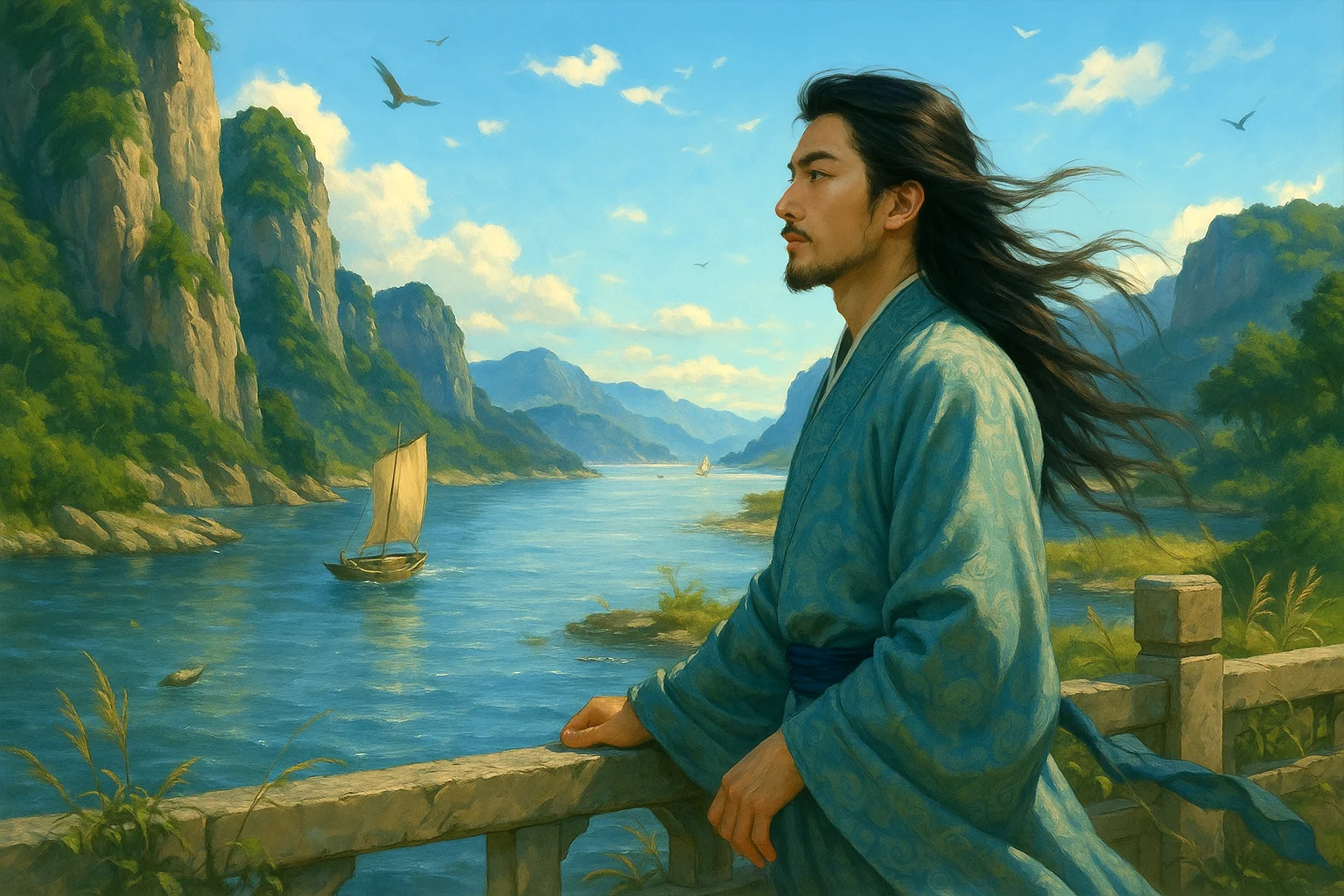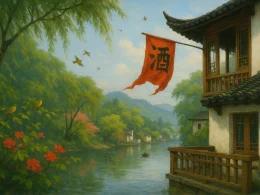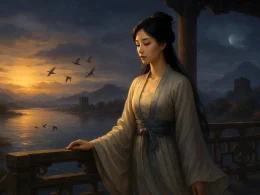Rain so dark, I thought night had come,
Till winds returned with clearing skies.
Pale clouds, slanting light—mountains brighten,
Soft grass, smooth sand—hooves tread lightly.
Morning wine leaves me drowsy still,
No dream of fairy lands fulfilled.
Where on Blue Bridge is Cloud Maiden found?
Only the sentimental stream walks with me around.
Original Poem
「南歌子 · 雨暗初疑夜」
雨暗初疑夜,风回便报晴。
淡云斜照著山明,细草软沙溪路马蹄轻。卯酒醒还困,仙村梦不成。
苏轼
蓝桥何处觅云英?只有多情流水伴人行。
Interpretation
Composed in 1079 (元丰二年) during Su Shi's governance of Huzhou, this lyric emerges on the eve of the historic "Wutai Poetry Case." Though physically immersed in Jiangnan's watery landscapes, the poet's mind remains unsettled like unquiet tides. Through the prism of a wine-hazed journey, the verses oscillate between dream and reality, conveying inner restlessness, disillusionment, and metaphysical contemplation. The work dazzles with its fluid imagery—where landscape painting merges with philosophical depth—creating a piece of crystalline freshness and resonant profundity.
Upper Stanza: "雨暗初疑夜,风回便报晴。淡云斜照著山明,细草软沙溪路马蹄轻。"
Yǔ àn chū yí yè, fēng huí biàn bào qíng. Dàn yún xié zhào zhe shān míng, xì cǎo ruǎn shā xī lù mǎ tí qīng.
Rain’s gloom first mimics night’s persistence—
till shifting winds herald clearing skies.
Pale clouds, slant-lit, etch mountains in sharp relief;
along the creek-path, tender grass and yielding sand—
my horse’s tread turns weightless.
The stanza paints nature’s mercurial transformations. "Rain’s gloom" (雨暗) dissolves into "slant-lit" (斜照) clarity, mirroring the poet’s psychological transition. The "weightless" (轻) hoofbeats on "yielding sand" (软沙) create synesthetic harmony—where tactile sensations echo emotional unburdening. This momentary transcendence foreshadows the coming disillusionment.
Lower Stanza: "卯酒醒还困,仙村梦不成。蓝桥何处觅云英?只有多情流水伴人行。"
Mǎo jiǔ xǐng hái kùn, xiān cūn mèng bù chéng. Lán qiáo hé chù mì yún yīng? Zhǐ yǒu duō qíng liú shuǐ bàn rén xíng.
Dawn wine leaves me sober yet drowsy—
that immortal village dream now shattered.
Where might Lan Bridge’s Yunying be found?
Only this sentimental stream accompanies my steps.
The disillusionment crystallizes through layered metaphors. The "immortal village" (仙村) and "Lan Bridge" (蓝桥) references—symbolizing unattainable ideals—collapse into the tangible companionship of "sentimental stream" (多情流水). The stream’s personification transforms it into both witness and comforter, embodying nature’s capacity to solace human solitude. The closing line’s lingering cadence mirrors the endless flow of both water and existential contemplation.
Holistic Appreciation
Set against the backdrop of spring rain clearing over Jiangnan landscapes, this lyric poem moves seamlessly from reality to dreamscape and back again, creating a layered and natural progression of scenes and emotions. The first stanza paints a tranquil picture of post-rain clarity—soft clouds, slanting sunlight, fine grass, and sandy paths—all rendered with delicate, understated beauty. The line "fine grass and soft sand, hooves light on the creek path" captures the ease of travel after rain, subtly conveying the poet’s fleeting moment of peace amid life’s turbulence.
The second stanza deepens in emotional resonance, shifting from "morning wine" to a dream of "an immortal village," alluding to the Tang tale "The Story of Pei Hang," where Yunying symbolizes an unattainable celestial beauty. This turn transforms the poem from leisurely scenery into philosophical meditation: earthly life is but a dream, paradise remains elusive, and only the flowing stream understands human longing. The stream, personified as "sentimental," becomes a companion in solitude, reflecting life’s transience and the poet’s wandering state.
Though the poem touches on dreams and legends, it never drifts into abstraction. Instead, it roots itself in the tangible emotions of human existence, embodying Su Shi’s ethos of "persisting despite knowing the impossible." Despite the unrealized dream and the unattainable fairy maiden, the poem’s warmth lingers in the Jiangnan spring and the murmuring creek, revealing the poet’s tender attachment to nature and life.
Artistic Merits
- Elegant Simplicity, Emotion in Scenery
The first stanza sketches a landscape with effortless grace—pale clouds, slanting light, tender grass, and soft sand—crafting a vivid spring journey scene where emotion blends naturally with the view. - Allusive Depth, Blending Myth and Reality
The second stanza introduces the "Blue Bridge" and "Yunying" from Tang lore, using celestial imagery to express yearning and disillusionment. This romantic interplay of myth and reality enriches the poem’s emotional texture. - Fluid Transitions Between Real and Ethereal
From "sobering from wine" to "a dream unrealized," from "Yunying lost" to "the stream as companion," the poem shifts between concrete and abstract, grounding lofty ideals in earthly resonance. - Understated Closure, Lingering Resonance
The final line, "only the sentimental stream walks with me," appears plain but carries profound meaning. By personifying the stream, the poet projects human emotion onto nature, leaving the reader with unspoken depth.
Insights
This poem reflects Su Shi’s contemplative journey through life’s illusions and awakenings. Though he dreams of transcendence (Yunying), he finds solace in the constant companionship of nature (the stream). The work embodies a philosophy of serene acceptance—even when dreams fade, the beauty of the present moment remains. It teaches us that while ideals may elude us, the world still offers warmth and meaning in its flowing waters and quiet paths.
About the Poet

Su Shi (苏轼, 1037 - 1101), a native of Meishan in Sichuan, was a polymath of the Northern Song literary world. His prose was expansive and unrestrained, his poetry fresh and vigorous, and his ci poetry pioneered the bold and unconstrained style. In calligraphy, he created the "Su Style," and in painting, he championed "spiritual resonance," earning him a place among the "Four Masters of the Song." Despite repeated political persecutions—most notably the "Poetry Case of the Black Terrace"—his exile to Huangzhou, Huizhou, and Danzhou yielded timeless masterpieces. Lu You praised him as "the literary patriarch of an era."












